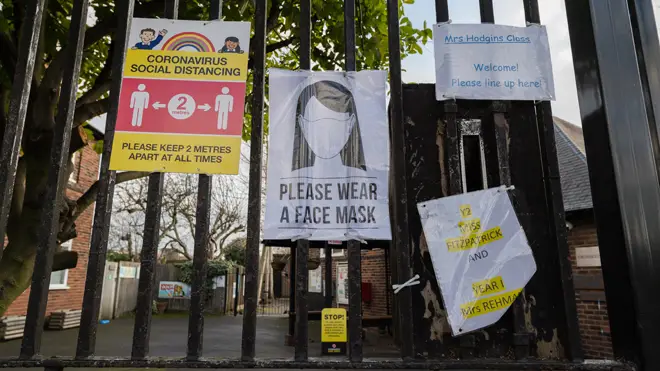
Ben Kentish 10pm - 1am
4 January 2021, 06:47 | Updated: 4 January 2021, 08:55

Most primary schools in England will reopen today despite concerns over rising covid rates.
Boris Johnson said he has "no doubt" that classrooms are safe and parents should send children back to schools in England which remain open.
But parents and teachers face a "confusing picture" according to a teaching union, with local authorities calling on the Government to delay children returning to classrooms.
All of London's primary schools and those in some surrounding areas will not reopen until January 18 due to the fast-spreading variant of Covid-19, with students elsewhere expected to return to classrooms on Monday.
But councils in Cumbria and Kent have urged the Government to allow schools to remain closed in other areas, while teaching unions are calling for all schools to switch to remote learning for a brief period.
Paul Whiteman, general secretary of school leaders' union NAHT, said it was "very hard to tell" how many schools would be open for the start of the term.
"Some schools in Tier 4 areas will be open for vulnerable pupils and key worker families and will be providing remote learning for others, yet in other areas also in Tier 4, all pupils will be admitted," he said.
"That's a confusing picture for school leaders and families alike."
Council leaders in Wolverhampton, Norfolk, Slough, Manchester, County Durham, Lancashire, Birmingham and Gateshead said they would support the decision of head teachers who do not think it is safe for the school to open.
On Sunday, Cumbria County Council said it had written to the Department for Education (DfE) for permission to keep primary schools in the area closed for the first two weeks of term.
Stewart Young, leader of the council in the rural county - which is one of the areas outside London and the South East hardest hit by the variant, said the Government had responded that schools should open as planned.
"This is disappointing news and I feel that this is the wrong decision for Cumbria and for our families and communities," he said in a statement.
Leader of Kent County Council Roger Gough urged Education Secretary Gavin Williamson to keep all primary schools in the county closed, saying it is "very hard to justify" letting some schools open while others are closed.
Primary school pupils in Thanet, Canterbury, Dover and Folkestone and Hythe are expected to return on Monday while the other districts in Kent will learn remotely for the first two weeks of term.
Similarly, Essex County Council said it was seeking "urgent clarity" from the Government on the position of reopening schools in north Essex amid rising infection rates.
It said that primary schools in Colchester, Tendring and Uttlesford - the only districts in Essex where schools were due to reopen - would move to remote learning from Tuesday.
Brighton and Hove City Council has advised primary schools in the Tier 4 area not to return in person, except for vulnerable children and those of key workers, until January 18.
Secondary schools in England will have a staggered return, with those taking exams this year resuming in-person teaching on January 11 and other year groups on January 18.
General secretary of the National Education Union (NEU) Dr Mary Bousted has said schools should stay closed for two weeks to "break the chain" of transmission and prevent the NHS becoming "overwhelmed".
The union, which represents the majority of teachers, has advised its members it is not safe to return to classrooms on Monday.
A further 454 people have died within 28 days of testing positive for Covid-19 as of Sunday, while there were another 54,990 lab-confirmed cases of coronavirus in the UK, according to the Government.
It comes as the NHS ramps up its vaccination programme with the newly approved Oxford University and AstraZeneca jab, with 530,000 doses available for rollout across the UK from Monday.
Six hospital trusts will be the first to administer the vaccine before the bulk of supplies are sent to hundreds of GP-led services to be rolled out, according to NHS England.